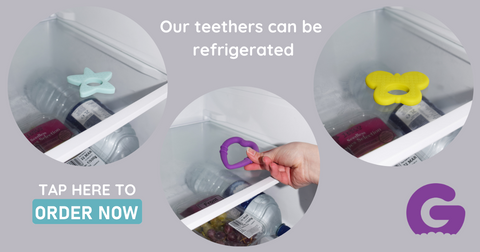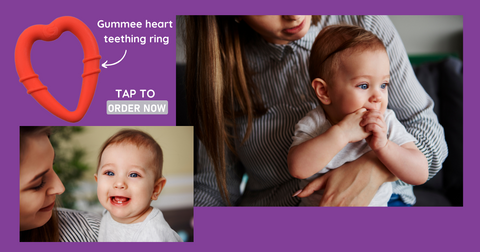Night-time Teething Woes: Tips to Help Your Baby Sleep
Introduction:
Teething is a milestone that every baby goes through, but it can be a challenging time for everyone in the household, especially when it comes to getting a good night's sleep. As a parent, it's tough to see your little one in discomfort, especially when it disrupts their sleep patterns. However, there are several strategies you can try, to help soothe a teething baby and ensure everyone gets some much-needed rest. In this blog post, we'll explore some effective techniques for comforting a teething baby at night.
- Provide Comfort Items:
-
One of the simplest ways to ease your baby's discomfort during teething is by providing comfort items such as a favourite blanket or soft toy. These familiar objects can offer a sense of security and help soothe your baby back to sleep when they wake up due to teething pain.
- Use Teething Toys:
-
Teething toys are specifically designed to provide relief to teething babies by allowing them to chew and gnaw on safe, textured surfaces. Keep a few teething toys in your baby's crib or near their bed so they can easily reach for them when they wake up in discomfort. Look for toys made from safe, BPA-free materials that are easy for your baby to grasp and manipulate.
- Try Chilled Teething Rings or Washcloths, dampening the washcloth little first so that the moisture holds more of the cool temperature:
-
Cold can help numb sore gums and provide temporary relief from teething pain. Consider chilling teething rings or damp washcloths in the refrigerator (not freezer) before giving them to your baby to chew on. The cold sensation can help reduce inflammation and soothe sore gums, making it easier for your baby to drift back to sleep.
- Use Pain Relief Methods:
-
If your baby is particularly uncomfortable, you may consider using pain relief methods such as infant acetaminophen or ibuprofen. However, it's essential to consult with your GP before giving any medication to your baby, especially if they are under a certain age or have specific health conditions. Follow the dosage instructions carefully and only use pain relief medication as directed by your healthcare provider.
- Offer Comforting Snuggles:
-
Sometimes, all a teething baby needs is some extra cuddles and reassurance from their parents. If your baby wakes up in discomfort, try soothing them with gentle rocking, soft singing, or calming shush sounds. Skin-to-skin contact can also be incredibly comforting for both you and your baby, helping to reduce stress and promote relaxation.
- Maintain a Consistent Bedtime Routine:
-
Establishing a consistent bedtime routine can help signal to your baby that it's time to wind down and prepare for sleep. Include soothing activities such as a warm bath, gentle massage, or quiet story time to help your baby relax before bed. Consistency is key, so try to stick to the same bedtime routine every night to help your baby feel secure and comfortable. This blog post that we wrote last year may help with night time routine tips.
Conclusion:
Teething can be a challenging time for both babies and parents/carers, especially when it disrupts sleep patterns. However, with patience, understanding, and the right strategies, you can help soothe your teething baby and ensure everyone gets the rest they need. By providing comfort items, using teething toys, offering chilled teething rings or washcloths, using pain relief methods responsibly, offering comforting snuggles, and maintaining a consistent bedtime routine, you can help ease your baby's teething discomfort and promote better sleep for the whole family. Remember, every baby is different, so be patient and experiment with different techniques to find what works best for your little one.
Lastly, remember that teething is just another phase that your little one goes through…this too shall pass!



